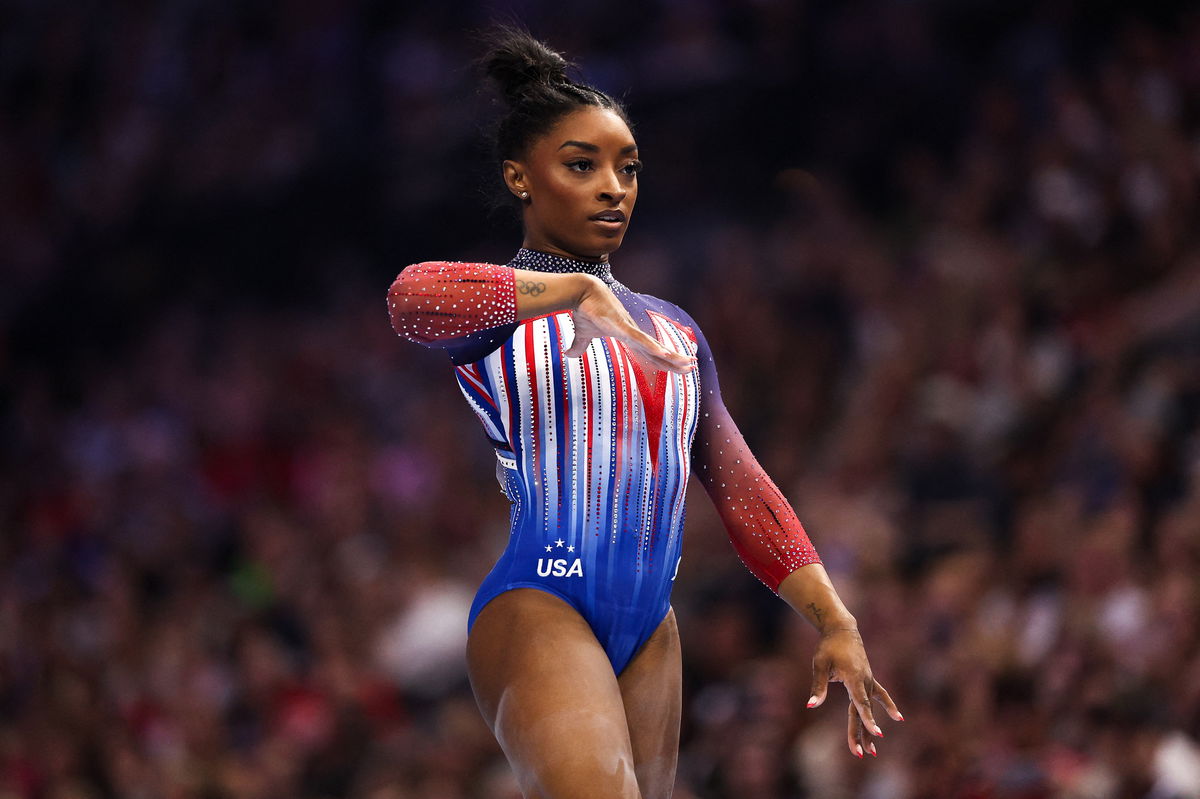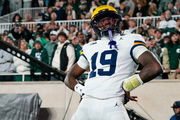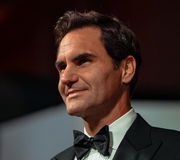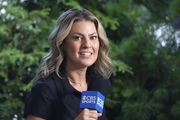
USA Today via Reuters
Jun 30, 2024; Minneapolis, Minnesota, USA; Simone Biles competes on the beam during the U.S. Olympic Team Gymnastics Trials at Target Center. Mandatory Credit: Matt Krohn-USA TODAY Sports

USA Today via Reuters
Jun 30, 2024; Minneapolis, Minnesota, USA; Simone Biles competes on the beam during the U.S. Olympic Team Gymnastics Trials at Target Center. Mandatory Credit: Matt Krohn-USA TODAY Sports
The excitement for the opening ceremony was through the roof on a rain-drenched evening as the flagbearers cruised down a 6km stretch of the Seine on 85 boats. Snoop Dogg carried the Olympic flame from Austerlitz Bridge on July 26, tagged along with him were 6,800 athletes, 300,000 spectators filling specially built stands and riverbanks, plus another 200,000 watching from balconies and apartments. However, Simone Biles was missing, which was a real letdown for many. But why?
Watch What’s Trending Now!
Biles’ family members, including Ron and Nellie Biles, were present to revel in the festivities. Naturally, the query went to them. An NBC reporter asked Simone Biles’ mother, Nellie Biles,” Is Simone Biles not going to be there during the opening because she has got to compete this weekend?”
Nellie confirmed, “Yes, that’s correct. The first competition is on Sunday, which is fast approaching, and of course, she needs to rest up before then.” On Sunday, the women gymnasts of the USA take the stage for the qualification rounds.
ADVERTISEMENT
Alongside thousands of enthusiasts, Biles will have the support of 17 family members. Nellie, who appeared with Snoop Dogg and Hoda Kotb, also informed, “She is feeling really good. I spoke to her this morning and she’s feeling great.” However, Simone did get a glimpse of the Seine.
An X post by NBC featured Kotb and Dogg, along with Ron and Nellies Biles catching Simone on FaceTime. Sister Adria was also seen in the frame. “The best facetime Simone Biles will get today. 😍,” wrote the post. Indeed, Simone was sporting a wide smile as Hoda turned the mobile towards the camera. The entire contingency shouted out loud for her from the banks of the Seine, as they have always done.
The best facetime Simone Biles will get today. 😍
📺: #ParisOlympics Opening Ceremony on NBC and Peacock pic.twitter.com/O3q00aQ821
— NBC Olympics & Paralympics (@NBCOlympics) July 26, 2024
ADVERTISEMENT
But was this totally unexpected? Doubt that.
On Tuesday, the Washington Post reporter Emily Giambalvo had an insider revelation that Biles will likely not entertain media until the finals are over. On top of that, Biles was given the option not to compete in all four team final events. The decision was made to keep Biles’s “mind at ease” when her coach Cecile Landi approached Chellsie Memmel, the technical lead of the U.S. high performance staff. Here’s what Memmel recalled from the conversation,
ADVERTISEMENT
“If that’s what she needs to continue to be at her best for her team and for herself, then that’s what we’re going to do.”
Meanwhile, Nellie’s revelation probably will finally stop a debate that has been raging in the country in the wake of the announcement that Coco Gauff was to be the female flag bearer for Team USA. They openly trashed the idea, claiming that athletes like Simone Biles or Katie Ledecky would have been a more appropriate choice for the job. They probably forgot to take a look at the competition schedule of the Olympics.
ADVERTISEMENT
While Simone competes on Sunday, Katie’s 400m free event is on Saturday, the very next day of the opening ceremony. And probably, the decision of Simone skipping the ceremony was taken months back. In May, USA Gymnastics CEO Li Li Leung told reporters that athletes attending the ceremony should “plan to be on their feet for nine hours.” While she stated that the call is finally on the individual gymnasts, it will be “discouraged” because of the physical toll.

ADVERTISEMENT
The hunger for success of the oldest woman on the US women’s gymnastics team knows no stopping. So, Simone, who proudly wears the nickname “grandma” in the gym, is striving to add a sixth unique skill to her name by perfecting a new move on the uneven bars. On July 25th, she submitted this innovative move to the International Gymnastics Federation. If she successfully lands it during the women’s qualifying on Sunday, it will be officially recognized as her sixth skill.
Currently, Simone Biles has two elements named after her in the vault, including the dreaded Yurchenko double pike, and one each on the floor exercise and balance beam. Her latest move involves a forward circle around the lower bar, ending with a 540-degree spin. While preparations are going on in all directions, one concern is brewing on the sidelines.
ADVERTISEMENT
Can the weather play a spoilsport in the Olympics?
A downpour on the opening day was predicted much ahead. So, many of nearly 300,000enthusiasts appeared prepared with rain suits and umbrellas. But what happens after that till August 11? The findings are somewhat alarming.
According to the weather reports, it will remain overcast and rainy for most of Saturday, with 5 to 10 mm of rain, and up to 15 mm locally. Sunshine might come back on Sunday. “We’re expecting a rise in warm air from the Iberian Peninsula, which will cause temperatures to rise throughout France,” Jerome Lecou, a forecaster at Meteo-France said. This forecast of rising temperatures might concern meteorologists, considering the intense heat that boosted temperatures in Spain and southeastern Europe past 38 Celsius in recent weeks.
ADVERTISEMENT
So the fear of a potential heatwave is quite prominent among the athletes and scientists. And that is not completely baseless. The Olympics are being held on the days of the hottest weeks of the year. High temperatures during 26th July ranged from 75 to 102 degrees Fahrenheit (24 to 39 Celsius). History also speaks in favor of the rising temperature.
Top Stories
Greg Biffle’s $4M Worth Prized Possession Still Without a Buyer Leaves NASCAR Fans Heartbroken

LIV Golf Braces for Another Possible Exit in Wake of Brooks Koepka Departure

Sean Payton Announces Retirement Plans as Broncos HC Demands Improvement From Bo Nix & Co. Before Playoffs

Biff Poggi All But Confirms Bryce Underwood’s Michigan Future After Announcing His Own Departure

Roger Federer Draws Criticism from Swiss Government Chief for Tourism Boom in Country

Amanda Balionis Confirms New Relationship Ending Months of Rumors

It shows that temperatures rose by 2.8°C from July 26 to August 11 between 1872-1901 and 1994-2023. To give more context in the matter, the average temperature in Paris during the dates of the Olympics has climbed more than five degrees during the past 100 years (counting from the last Olympics in 1924). The incidents of the recent past might be further intimidating.
As per records, July-August has been the red-hot period in French history. More than 5000 people died of heat waves in 2023 while the figure stands at more than 2,800 deaths in 2022. In July 2022, Tour de France authorities sprayed water on roads to keep them from melting as temperatures soared to near 104 (40 Celsius). On July 25, 2019, Paris recorded an all-time high temperature of 109 degrees (43 Celsius). There is more to it.
ADVERTISEMENT
France saw probably the deadliest heat wave that killed nearly 15,000 people in August 2003, when highs reached the upper 90s (36 to 37 Celsius) for more than a week, peaking at 103 (39 Celsius). An 18-day heat wave in July 2006, killed nearly 2,000 people. The problems of such hot weather are two-pronged. While this can hamper athletes’ practice during the daytime, it can also affect their sleep during the night. However, Lecou has some positive news.
According to him, there is a ‘very low risk’ of a heatwave during that period. On a similar line, Pascal Yiou, research director of the French Alternative Energies and Atomic Energy Commission (CEA) stated that the risk “seems very low for this summer.” We can only hope that after the rain partially marred the opening day, extreme weather conditions do not disrupt the remaining of the games.
ADVERTISEMENT
ADVERTISEMENT
ADVERTISEMENT

